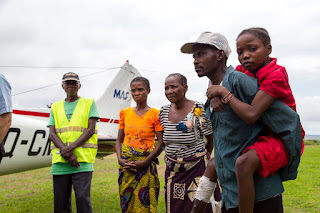*If you clicked on the link out of curiosity, I must provide
a secondary warning of the graphic content. While there are no photos attached,
I will be talking about a topic that could be uncomfortable to many regarding
how animals fit into life here in Congo.
With dry season coming to a close, most animals will have
foraged all the food that is available to them; and until the rains come again
to bring new life to the plants, it is time to butcher the animals.
My first experience with how animals are regarded in this
culture came when we moved here. We were taking care of some rabbits for our
friends. Unbeknownst to us, the workers bred two of the rabbits.
I awoke one morning to find a few small kits. I hit the internet to research how to take
care of the babies, but I did not learn fast enough. Sure enough, the following
morning, one had died. I told the worker on duty one had died, but the look on
my face must have been one of sorrow or pity. He immediately explained to me that
animals are food and that I should not cry if they die (I am paraphrasing since
my French and his English were not good). He said my family will not go hungry
because one had died, so I should not mourn the loss.
A short time later, another of our friend’s friendly cat went
missing. When asked about the whereabouts, the answer was the same, they had
seen it before. I did not put two and two together about the cat until I was
driving to the grocery store and I saw an animal freshly killed that was hung
up and was being butchered. It was a very large dog. It was then I realized
that there are almost no stray animals here at all. You see goats tethered. You
see ducks with cut wings so they stay close by. You see chickens with strings
around their leg. You might see rabbits in a cage. Occasionally you will notice
a dog, but the owner is usually selling its pups. And very rarely will you see
a cat outside of an expat’s home.
You see, animals are costly to maintain, prohibitively
expensive to the level we expect in the US, even if they are only to be eaten.
Therefore, there must be a return on the investment. If you feed an animal, one
expects to be able to breed it to sell its offspring or one expects to have
meat for their family - so forming any emotional attachment would be pointless.
It was very hard for me to accept this idea having not grown up on a farm. My
grandfather was a hunter but I had little exposure to the meat.
Another tough lesson happened to Kevin, who did grow up on a
farm and is not a stranger to hunting. Recently at the airport, he heard a
commotion. He walked until he found a group of grown men in battle stances,
each with large sticks circled up around a car. They were in hunting mode.
Being curious, Kevin looked around the corner to try and see what worthy
opponent deserved this level of intensity, but one which could also fit under
the car. He imagined seeing something like a large snake, a large predatory
lion, crocodile, or even a really short hippopotamus (hey, those things are
actually quite dangerous). The men continued arguing over who had the largest
family and who needed the meat the most.
The owner of the car arrived, and as he reversed away out of the parking
spot, there was a mangy street cat. These men were fighting over an animal that
was less than 3 pounds, hoping to feed their family a meal for the day. You
would have thought the men had taken down an entire herd of antelope with the
cheering that ensued after the deed was done.
On an overnight trip in the bush, Kevin was offered smoked
meat from a boa constrictor and not long after, he was offered meat (the arm)
from a monkey that he heard them killing. Kevin has also been given a gift of
fresh goat meat and was given the honor of watching them slaughter the animal
before him so that they may present him with the best cuts, and has eaten
snails and other creepy crawlies that are highly valued for their protein
content.
Meat is always an honor due to its high cost (both monetary
and husbandry). You do not refuse such a gift. So as we continue to adapt our
lives here to the culture around us, this is one area of life that needed
re-thinking that surprised us. We have to keep reminding ourselves, it’s
different, not wrong.












